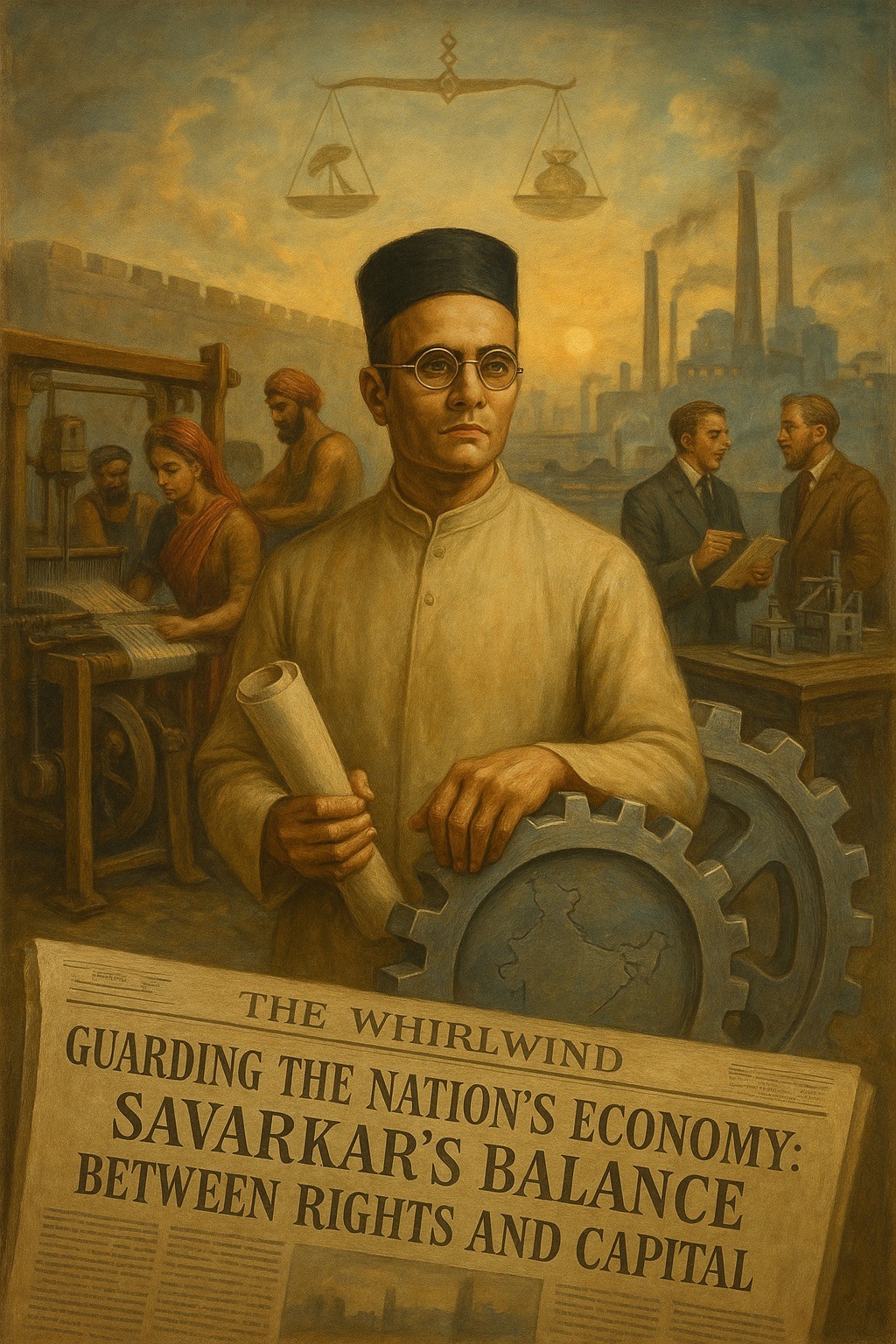Economic Dimension of Hindutva, Part 10; Savarkar’s Economic Principles (6/13)
Economic stability and national prosperity depend on a balanced relationship between industry, labor, and capital. In a thriving economy, workers should fairly partake in the profits of the industry. However, in times of economic downturn, just as capital suffers losses, workers too must be prepared to accept a reduced share. This principle is crucial in safeguarding the nation’s industrial and economic development from self-serving motives of certain interest groups – whether they represent labor or capital.
The Role of the State in Economic Regulation
Vinayak Damodar (Veer) Savarkar emphasized the responsibility of the state in regulating economic claims from both workers and capital. He argued that the government must consistently evaluate and, when necessary, intervene to maintain economic balance. This principle suggests that the state must not only act as a neutral mediator but also be prepared to enforce decisions that align with national interests.
Though Savarkar does not explicitly call for coercion, his ideas imply that the government must be willing to take decisive action when industrial or economic progress is hindered by conflicting interests. The broader goal is to ensure that national industries remain strong, independent, and self-sufficient, free from excessive demands that could jeopardize economic stability.
Government Intervention and Coercive Measures
Savarkar’s perspective suggests that if the resistance of particular groups obstructs necessary economic policies, state intervention becomes essential. This intervention can take several forms, including:
- Nationalization of Key Industries – The government taking control over crucial sectors to prevent monopolization or foreign dominance.
- Regulation of Agricultural Production – Ensuring food security and stable agricultural output through strategic oversight.
- Prohibition or Restriction of Labor Strikes – Limiting industrial actions that could significantly disrupt the economy.
These measures highlight Savarkar’s pragmatic approach to economic governance. He recognized that while individual rights and interests are important, they must not supersede the greater national good. His vision underscores the necessity of a strong and proactive state that ensures economic resilience and industrial progress.
Final Thoughts
Savarkar’s economic philosophy offers a compelling perspective on maintaining industrial stability. By advocating for a balance between workers’ rights and capital interests, he underscores the importance of national self-sufficiency. While his ideas may appear rigid in certain aspects, they reflect a deep commitment to protecting the nation’s economy from both internal and external vulnerabilities. In today’s globalized world, his insights remain relevant as countries seek to navigate economic fluctuations while preserving their industrial strength.
💭 What do you think? Do you think an ideology like Hindutva can remain complete without a clear economic vision? Why or why not? How important is economic policy in shaping a nation compared to cultural or political identity? Should political leaders be expected to develop economic frameworks, or can that task be left to economists and policymakers? If you were in Savarkar’s position during the 1930s–40s, would you have prioritized political unity or economic development? Do you see his lack of economic focus as a weakness, or as a practical choice given the circumstances? How might his emphasis on modernity, science, and progress translate into economic policy in the 21st century?
👉 Share your thoughts in the comments below!
Sources:
DESHPANDE, Sudhakar. 1999. Savarkar. The Prophetic Voice. Dastane Ramchandra & Co.: Pune.
KRÜGER, Horst. 1985. Anfänge sozialistischen Denkens in Indien. Der Beginn der Rezeption sozialistischer Ideen vor 1914. Band II. Akademie-Verlag: Berlin.
PATWARDHAN, V. S. 1989. „Savarkar’s Economic Thinking“, in PHAKE, Sudhir/PURANDARE, B. M. and Bindumadhav JOSHI. (Eds.). 1989. Savarkar. Savarkar Darshan Pratishtnah (Trust): Bombai (Mumbai), 118-122.
PHADTARE, T. C. 1975. Social and Political Thought of Shri V.D. Savarkar. A Thesis submitted to the Marathwada University for the Degree of Doctor of Philosophy. Unpublished: Aurangabad.
ROTHERMUND, Dietmar. 1985. Indiens wirtschaftliche Entwicklung. Von der Kolonialherrschaft bis zur Gegenwart. Schöningh (UTB): Paderborn.
ROTHERMUND, Dietmar. 1983. The Indian Economy under British Rule and other Essays. Manohar: New Delhi.
SAVARKAR, Vinayak Damodar .2007. Hindu Rashtra Darshan. Bharat Bhushan. Abhishek Publications: New Delhi.
SAVARKAR, Vinayak Damodar. 1945. Hindu Rashtravad. Being an Exposition of the Ideology & Immediate Programme of Hindu Rashtra as outlined by Swatantrayaveer V.D. Savarkar. Rohtas Printing Press: Rohtak. (Collected & Edited by Satya Parkash).
WOLF, Siegfried O. 2010. Savarkar’s Strategic Agnosticism. A compilation of his political and economic worldview, in Heidelberg Papers in South Asian Comparative Politics (HPSACP), No. 51, Heidelberg University, Germany.
WOLF, Siegfried O. 2009. Vinayak Damodar Savarkar und sein Hindutva-Konzept. Die Konstruktion einer kollektiven Identität in Indien [“Vinayak Damodar Savarkar and his concept of Hindutva: The construction of a collective identity in India.”]. Online Dissertation: Heidelberg University: Heidelberg.


Leave a Reply